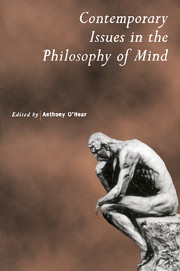Book contents
- Frontmatter
- Contents
- Notes on Contributors
- Introduction
- The Mind–Body Problem After Fifty Years
- How to Find the Neural Correlate of Consciousness
- Embodiment and the Philosophy of Mind
- Folk Psychology and Mental Simulation
- Understanding Other Minds from the Inside
- Self-knowledge: the Wittgensteinian Legacy
- Joint Attention and the First Person
- Consciousness as Existence
- Setting Things before the Mind
- Perceptual Intentionality. Attention and Consciousness
- Experience and Reason in Perception
- Intentionality as the Mark of the Mental
- Intentionality and Interpretation
- Externalism and Norms
- Mind, World and Value
- Mind, Knowledge and Reality: Themes from Kant
- The Modality of Freedom
- Dualism in Action
- Index
Self-knowledge: the Wittgensteinian Legacy
Published online by Cambridge University Press: 12 May 2010
- Frontmatter
- Contents
- Notes on Contributors
- Introduction
- The Mind–Body Problem After Fifty Years
- How to Find the Neural Correlate of Consciousness
- Embodiment and the Philosophy of Mind
- Folk Psychology and Mental Simulation
- Understanding Other Minds from the Inside
- Self-knowledge: the Wittgensteinian Legacy
- Joint Attention and the First Person
- Consciousness as Existence
- Setting Things before the Mind
- Perceptual Intentionality. Attention and Consciousness
- Experience and Reason in Perception
- Intentionality as the Mark of the Mental
- Intentionality and Interpretation
- Externalism and Norms
- Mind, World and Value
- Mind, Knowledge and Reality: Themes from Kant
- The Modality of Freedom
- Dualism in Action
- Index
Summary
It is only in fairly recent philosophy that psychological self-knowledge has come to be seen as problematical; once upon a time the hardest philosophical difficulties all seemed to attend our knowledge of others. But as philosophers have canvassed various models of the mental that would make knowledge of other minds less intractable, so it has become unobvious how to accommodate what once seemed evident and straightforward – the wide and seemingly immediate cognitive dominion of minds over themselves.
In this paper I'll begin by trying to characterize this dominion with some care. We need to have it as clear as possible why one traditional way of thinking about the matter has seemed so attractive – even unavoidable – and what a satisfactory account of the issues in this region has to accomplish. However my overarching concern will be with the bearing of later Wittgensteinian materials on the question. Ultimately I think we can get an insight into the intended force of something which I do not think has so far been sufficiently well understood: the anti-explanatory motif that runs through the pronouncements on philosophical method occurring in the Philosophical Investigations.
People can be variously deluded about themselves, self-deceived about their motives, for instance, or overly sanguine, or pessimistic, about their strengths of character and frailties. But it is nonetheless a truism that for the most part we know ourselves best – better than we know others and better than they know us.
- Type
- Chapter
- Information
- Contemporary Issues in the Philosophy of Mind , pp. 101 - 122Publisher: Cambridge University PressPrint publication year: 1998
- 9
- Cited by



